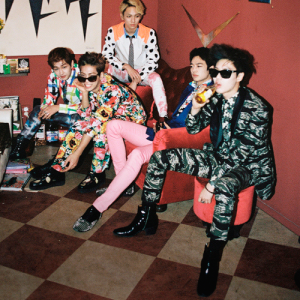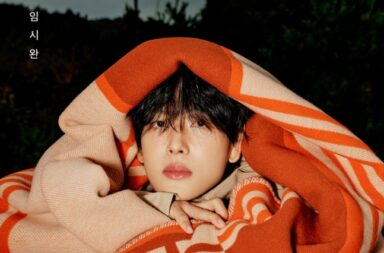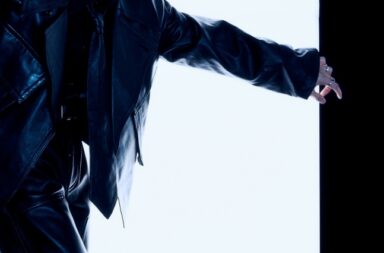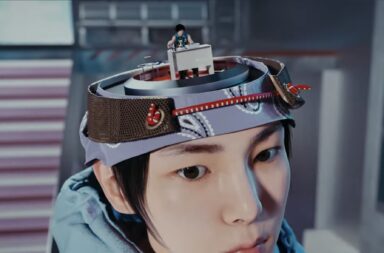Imagine a Gatsby world with … a little bit of Shinee?
Imagine the Roaring Twenties filled with bootlegged fizzies, loud weekend parties at Gatsby’s mansion in West Egg, sprinkled with a five-piece male pop group performing in floral dinner jackets, dancing to dynamic choreography, swoon-worthy enough to tingle the senses.
Gatsby-verse is at fever pitch: F. Scott Fitzgerald’s “The Great Gatsby” has been re-imagined for the big screen for the fourth time since the book’s publication in 1925, and the Leo DiCaprio version was released this past Friday, directed by Baz Luhrmann, he of “Moulin Rouge!” and “Romeo + Juliet” fame.
If you grew up in America, you’ve probably read the book in high school. Maybe you wanted to punch Nick Carraway in the face or kick Tom Buchanan in the nuts, but Gatsby was the underdog you rooted for. The godly, millionaire underdog, but underdog nonetheless.
And Shinee with their bling bling and their neat bow ties is a natural for the Gatsby world.
The Misconceptions of Me
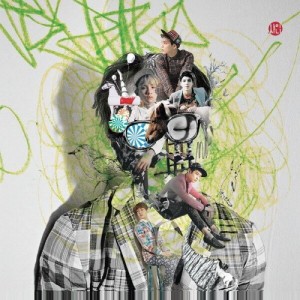 Shinee’s two-parter mega third album is titled “The Misconceptions of Me,” which might as well have been named after Fitzgerald’s most famous protagonist. Nobody really knows what Gatsby does, just that he throws the best parties in all of New York City and that he has a lot of money. He might have been an Oxford man, he might have killed one, but who knows?
Shinee’s two-parter mega third album is titled “The Misconceptions of Me,” which might as well have been named after Fitzgerald’s most famous protagonist. Nobody really knows what Gatsby does, just that he throws the best parties in all of New York City and that he has a lot of money. He might have been an Oxford man, he might have killed one, but who knows?
”Gatsby. Somebody told me–”
The two girls and Jordan leaned together confidentially.
“Somebody told me they thought he killed a man once.”
A thrill passed over all of us. The three Mr. Mumbles bent forward and listened eagerly.
“I don’t think it’s so much that,” argued Lucille sceptically; “it’s more that he was a German spy during the war.”
One of the men nodded in confirmation.
By the book’s end, after Gatsby is killed by a vengeful Mr. Wilson, the tabloids and newspaper went wild with stories about what happened — all untrue, but all of which went uncorrected because despite being immensely popular, nobody knew the real Gatsby.
The covers of Shinee’s “Misconceptions” are like tween pop renditions of the colorful blankness of the Gatsby world: faceless idols on one cover, violent scribbles on another, and a large pair of spectacles that would do T.J. Eckleberry proud.
Shinee’s stage outfits take on a quality of calculated spontaneity that nicely mirrors the colorful luxury of the Jazz Age, updated for modern, hipster sensibilities: there’s a young decadence to the floral suits, finely tapered pants, smart bow ties. There’s an obvious stylishness and suavity in their way of dress, but Shinee always carries an air like this is their natural state; there was no attempt to actively appear well-dressed, they just are. Calculated spontaneity the name of the Gatsby game — we find out soon enough that Gatsby depends on the look of material wealth to convince others that he is rich, that he spends hundreds of thousands of dollars to throw lavish parties, in hopes that one day Daisy will spontaneously be lured into one of them, and they will be reunited.
Dream Girl
Daisy Buchanan is an epic love interest, not because we’re supposed to like her or because we even know anything about her innermost thoughts, but because she’s the person that made Jay Gatsby the Great Gatsby. He became great because of her; she was his “Dream Girl.”
Shinee sings:
When it started is not important1
I only see the perfect you in my eyes
In this gray world, only your red lips shine
The moment I try to kiss your lips
I awake from my dreamYour face is still so clear
The heat of your hand that I held is still warm
You come to me at night but disappear in the morning2
I can’t just let you go like this every day
In Gatsby-verse:
1 Gatsby and Daisy reunite during the summer of 1922, and they had last seen each other five years prior, when Jay Gatsby had met and fallen in love with Daisy before going off to fight the war.
2 A recurring theme in “The Great Gatsby” is the green light at the end of Daisy’s dock, outside her house in East Egg. It’s a light that Gatsby takes to represent everything he’s chasing after, but is always too far from. Her green light is most visible at night, as Gatsby peers across from his mansion in West Egg.
오르골 (Orgel)
The Dutch/German word for “organ” is “orgel,” and “오르골” comes from the Japanese word for music box, “オルゴール”.
It goes round and round, this song for me
It goes round and round, slowly, my melody box
Round and round, getting dizzy
My orgelIt’s only us in this world1
Only dance for me
Aren’t you happy if you see me smiling always?Twinkle twinkle, the tears in your eyes make me smile2
I don’t want anyone to steal glances at you, smile for me3
I get pushed more and more with my sighs after entering a forest called you, from which I can’t escape
I don’t care if I die in this unknown place so hurry and come to me
1 Jay Gatsby was born into nothing and the lavish world we see is a self-made one. It’s opulent and dizzily excessive, just the way Gatsby thinks is impressive to others, and the only kind he imagines Daisy can accept. Gatsby may own a lot of things, but Daisy is the one whose “voice is full of money.”
2 “He took out a pile of shirts and began throwing them, one by one, before us, shirts of sheer linen and thick silk and fine flannel…While we admired he brought more and the soft rich heap mounted higher…Suddenly, with a strained sound, Daisy bent her head into the shirts and began to cry stormily. “They’re such beautiful shirts,” she sobbed, her voiced muffled in the thick folds. “It makes me sad because I’ve never seen such–such beautiful shirts before.”
3 Shinee’s song is soft and whimsical, but there is an underlying tone of possessiveness, well-illustrated in the two men in Daisy’s life. Daisy’s husband Tom is a womanizer and a racist, who was cheating on Daisy with a woman named Myrtle Wilson, but at the same time refuses to accept that Daisy loves someone else. Though not in the brutish, violent way Tom can be, Gatsby’s possessiveness is more evident in his absolute worship of Daisy and his inability to imagine his life with anyone else.
Excuse Me Miss
There is a good number of songs that go well lyrically with the themes and events in “The Great Gatsby,” but attitude and tone-wise, “Excuse Me Miss” might take the cake:
Why am I trembling so much? Why does it seem like my words are leaking out?1
Why am I blankly staring at my feet and getting shy?
With those sweet lips, you softly whisper in my ear
“I was already waiting for today since the beginning, come to me and hold my hand”—
It’s not that the path to you is too hard
It’s not that I suddenly wanted to be by your side one day
Because of our far distance, there are so many paths in between us2
I don’t know if you want to be with me yet3
On all of these endless paths that I can’t go alone,
I want to call you mine and hold hands with you
As we kiss, I want to have a verbal rendezvous
1 Gatsby gets Nick to agree to invite Daisy over to his house for tea, so that the three of them can be alone. On the day of afternoon tea, Gatsby gets fidgety that Daisy won’t show, and when she finally does, Gatsby is awkward and unnatural:
An hour later the front door opened nervously, and Gatsby, in a white flannel suit, silver shirt and gold-coloured tie, hurried in. He was pale, and there were signs of sleeplessness beneath his eyes…
“We haven’t met for many years,” said Daisy, her voice as matter-of-fact as it could ever be.
“Five years next November.”
The automatic quality of Gatsby’s answer set us all back at least another minute…
He followed me wildly into the kitchen, closed the door, and whispered: “Oh, God!” in a miserable way.
“What’s the matter?”
“This is a terrible mistake,” he said, shaking his head from side to side, “a terrible, terrible mistake.”
2 There’s a physical distance between Gatsby and Daisy, but there’s also the ideological distance of being Old Rich vs. New Rich. Daisy comes from wealth; Gatsby is self-made, and in this period, coming from new wealth is just as unseemly as being from a different class altogether.
3 One hot afternoon, Gatsby and Daisy plotted to let Tom know that they were in love and that Daisy was going to leave Tom. But the conversation doesn’t go the way Gatsby wants, and Daisy admits to Gatsby that she loved him too, implying that her heart was at one time with both men, and not solely with Gatsby alone.
– – – – – – – – –
 2AM may have a mini-album titled “F. Scott Fitzgerald’s Way of Love” and Nichkhun may have done a photoshoot named “A Little Gatsby, but it’s Shinee’s third album that makes an unexpectedly good pairing with the Fitzgerald classic. Who knew “Misconceptions of Me” could withstand this amount of dissection and produce this many parallels to one of the most beloved American novels?
2AM may have a mini-album titled “F. Scott Fitzgerald’s Way of Love” and Nichkhun may have done a photoshoot named “A Little Gatsby, but it’s Shinee’s third album that makes an unexpectedly good pairing with the Fitzgerald classic. Who knew “Misconceptions of Me” could withstand this amount of dissection and produce this many parallels to one of the most beloved American novels?
(Popgasa, Scribner Publishing, SM Entertainment)
